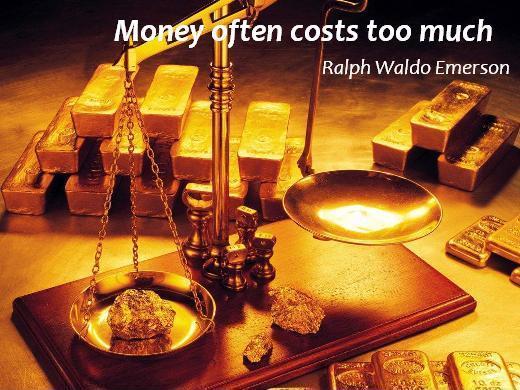Money often costs too much

Money often costs too much
Ralph Waldo Emerson, a renowned American essayist, lecturer, and poet, once famously said, "Money often costs too much." This profound statement by Emerson sheds light on the idea that the pursuit of wealth and material possessions can come at a great cost to one's well-being, happiness, and overall quality of life.Emerson believed that the relentless pursuit of money and material wealth could lead to a loss of one's true self and inner peace. He argued that the constant desire for more money and possessions could distract individuals from pursuing their passions, cultivating meaningful relationships, and finding true fulfillment in life. In essence, the pursuit of money can come at the expense of one's spiritual and emotional well-being.
Furthermore, Emerson believed that the pursuit of money could lead to a sense of emptiness and dissatisfaction. He argued that no amount of wealth or material possessions could ever truly satisfy the human soul. Instead of finding happiness and contentment in material wealth, Emerson believed that true fulfillment could only be found through self-discovery, personal growth, and the pursuit of one's passions and values.
Moreover, Emerson believed that the pursuit of money could lead to a loss of integrity and moral values. He argued that the relentless pursuit of wealth could tempt individuals to compromise their principles, ethics, and beliefs in order to achieve financial success. In this sense, the pursuit of money could come at the cost of one's integrity and moral compass.












 Friendship Quotes
Friendship Quotes Love Quotes
Love Quotes Life Quotes
Life Quotes Funny Quotes
Funny Quotes Motivational Quotes
Motivational Quotes Inspirational Quotes
Inspirational Quotes